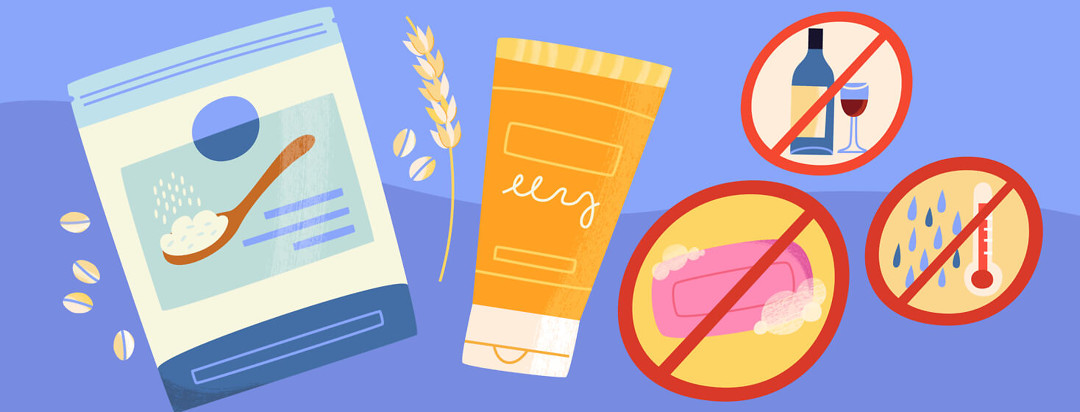Psoriatic Arthritis And Skin Care
Psoriasis causes red patches of inflamed skin, or plaques, that form during flare-ups. They are itchy, painful, and can crack and bleed. Plaques can form anywhere on your body but common sites are elbows, knees, and the scalp. Plaques can linger for several months before clearing.
People with psoriatic arthritis often have joint paint alongside problems with their skin. This makes skincare very important. Many steps can be taken to lessen the pain and discomfort brought on by flare-ups.
What triggers skin flare-ups?
Doctors know some triggers for flare-ups, but each person may have unique triggers. Some common triggers are:
- Illness: being sick may cause flare-ups.
- Drugs: some drugs cause flare-ups. One of the most common drugs to cause plaques is steroids. People report bad flare-ups as they end their course of steroids.
- Injury: any trauma to the skin can cause flare-ups. People report plaques after small surgeries, scraped knees, and even after bug bites.
- Weather: cold weather may cause flare-ups. Getting a sunburn can also cause your psoriasis to flare.
- Stress: constant stress is bad for the body. People often notice flare-ups after going through times of stress.
- Food: this trigger may be unique. Not everyone with psoriasis is triggered by foods.
What can I do to take care of my skin during a flare-up?
Taking care of your skin is important to lessen the pain. The following tips will help keep your skin healthy.
- Daily baths: warm baths help soothe inflamed skin. It also loosens plaques. Try adding Epsom salts or colloidal oatmeal to your bath for extra relief.
- Moisturize: keeping skin hydrated helps relieve symptoms. Dry skin is itchy and painful. It also cracks more. The National Psoriasis Foundation has a list of highly recommended lotions. People with psoriasis say that thick, creamy lotions help the most.
- Sunlight: getting outside for short amounts of time may help stop flare-ups. Some doctors use ultraviolet (UV) therapy for light exposure. People are placed under UV light for a few minutes several times a week. Be aware that some drugs may make you photosensitive. This means you are very sensitive to sunlight. Talk to your doctor before using light to treat psoriasis.
- Manage stress: keep your stress levels down. Try exercise, yoga, or meditation to promote calmness.
Avoiding skin care triggers
Many things make flare-ups worse. If you have psoriasis, you may want to avoid the following:
- Hot water: steaming, hot water will dry out your skin and make your symptoms worse. Try using warm water for baths.
- Harsh soaps and fragrances: soaps dry out your skin. Some soaps have fragrances that cause flare-ups. Try using a non-soap cleanser that is pH balanced. This will be gentle on your skin.
Alcohol: drinking a lot of alcohol can cause liver damage. The treatment for psoriasis can raise the risk of getting liver problems. The healthiest option for people with psoriasis is to avoid alcohol.
- Rubbing or picking at your skin: any trauma to the skin can cause a flare-up. Trauma can come from small actions like drying off too harshly after a shower. Picking at your plaques worsens symptoms. It may cause plaques to form in new places.
- Drugs: some drugs cause flare-ups. For example, the nicotine patch has been shown to cause flare-ups. If you are a smoker and want to quit, talk to your doctor about the safest way to quit. Talk to your doctor before starting any new drug.
Skin changes after plaques clear
Flare-ups can last several months. Once they clear, some people notice their skin is a different color. This is called a post-inflammatory change in pigmentation. This means that the pigment, or color, of your skin, maybe lighter or darker in the spots where your plaques were. This can last for several months.
Is there a way to treat post-inflammatory changes in pigmentation? When there is too much pigment, this is called hyperpigmentation. Doctors may use creams that lighten the skin. Talk to your dermatologist if you notice dark spots after plaques have cleared.
Controlling skin and psoriatic arthritis flare-ups
Avoid triggers and be as healthy as possible. Exercise, eat a well-balanced diet, and try to stay at a healthy weight. Staying fit helps lower your risk of getting other diseases known to affect people with psoriatic arthritis.
Keep a diary of triggers, and write down any details surrounding flare-ups. Over time you may notice a pattern of triggers that you can learn to avoid.
Community Poll
When it comes to living with multiple health conditions, I've found my:

Join the conversation